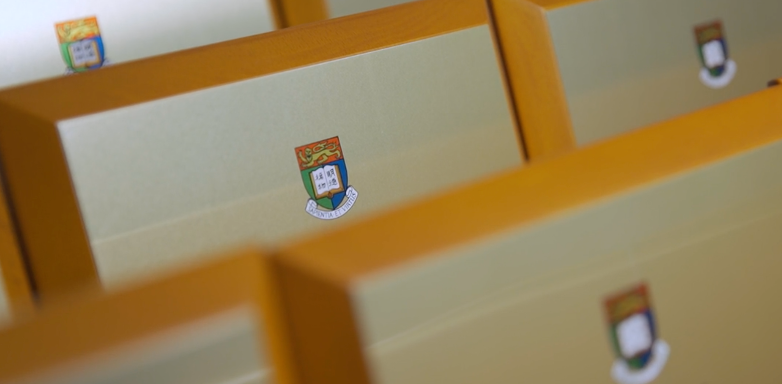

{{'Newsletter' | t}}
HKU Foundation Publication Award for Research Postgraduate Students
The HKU Foundation Publication Award for Research Postgraduate Students was established in 2022-23. Up to twenty awards may be made each year to research postgraduate students who have published a journal article of exceptional quality. The awards are funded by The University of Hong Kong Foundation for Educational Development and Research.

Yun Lin, School of Public Health
Incorporating temporal distribution of population-level viral load enables real-time estimation of COVID-19 transmission.
This paper is about using viral loads from COVID-19 cases to achieve real-time assessment of transmission risks over time in Hong Kong. Viral load refers to the quantity of virus within individuals infected with the virus and is usually measured using cycle threshold (Ct) values from PCR tests, an approach that has been widely used during the COVID-19 outbreaks. In this paper, we demonstrated that incorporating viral loads from COVID-19 cases under the symptom-based surveillance setting in Hong Kong during the third and fourth waves could support real-time tracking of transmission over time.
HKU has been very helpful in supporting my academic research by giving me access to modern facilities, encouraging a dynamic research community, and providing guidance and mentorship from experienced faculty members who have been invaluable in supporting my academic growth. The University's culture of collaboration and knowledge-sharing has allowed me to connect with other researchers and scholars from different fields, allowing me to broaden my perspective and gain new insights into my research topic.

Yizhou Wang, PhD, Department of Social Work and Social Administration
Effectiveness of enhancing contact model on reducing family caregiving burden and improving psychological wellbeing among caregivers of persons with schizophrenia in rural China.
This research was about the family caregivers of persons suffering from schizophrenia. We tried to help them by conducting a psychological intervention named the enhancing contact model. By using rigorous methodology, including a randomised controlled trial, the results indicate that this model can improve caregivers’ mental well-being and reduce caring burden.
I couldn’t have reached my goals without the support from HKU. First off, my supervisors played a huge role. They’re among the best in the world, sparking my interest in academic research. , guiding me in critical thinking and maintaining academic integrity, and boosting my spirits when I felt discouraged. Then, there’s my department – the Department of Social Work and Social Administration. They didn’t just teach us professional knowledge and skills; they also inspired us to be the next generation of social workers, ready to tackle the evolving challenges in Hong Kong’s social welfare landscape. Last but not least, the University itself gave me incredible support. HKU provided top-notch educational resources that have really opened my eyes. The University also supported my participation in exchange programmes and fieldwork, which is where my research idea originally came from.
2023 Awardees:
Dr Man Chun Chiu, School of Clinical Medicine
A bipotential organoid model of respiratory epithelium recapitulates high infectivity of SARS-CoV-2 Omicron variant.
DOI: https://doi.org/10.1038/s41421-022-00422-1
Mr Huanqing Cui, Department of Mechanical Engineering
Dynamic assembly of viscoelastic networks by aqueous liquid–liquid phase separation and liquid–solid phase separation (AqLL-LS PS2).
DOI: https://doi.org/10.1002/adma.202205649
Mr Beibei He, Department of Chemistry
Expanded sequence space of radical S-adenosylmethionine-dependent enzymes involved in post-translational macrocyclization.
DOI: https://doi.org/10.1002/anie.202212447
Mr Bingjie Hu, School of Clinical Medicine
Attenuated replication and pathogenicity of SARS-CoV-2 B.1.1.529 Omicron.
DOI: https://doi.org/10.1038/s41586-022-04442-5
Dr Feng Hu, School of Biomedical Sciences
DEPDC1B promotes melanoma angiogenesis and metastasis through sequestration of ubiquitin ligase CDC16 to stabilize secreted SCUBE3.
DOI: https://doi.org/10.1002/advs.202105226
Miss Kee Wah Leong, Department of Mechanical Engineering
Reversibility of a high-voltage, Cl–-regulated, aqueous Mg metal battery enabled by a water-in-salt electrolyte.
DOI: https://doi.org/10.1021/acsenergylett.2c01255
Mr Maosu Li, Department of Urban Planning and Design
A room with a view: Automatic assessment of window views for high-rise high-density areas using City Information Models and deep transfer learning.
DOI: https://doi.org/10.1016/j.landurbplan.2022.104505
Miss Yuebing Liang, Department of Urban Planning and Design
Memory-augmented dynamic graph convolution networks for traffic data imputation with diverse missing patterns.
DOI: https://doi.org/10.1016/j.trc.2022.103826
Miss Yun Lin, School of Public Health
Incorporating temporal distribution of population-level viral load enables real-time estimation of COVID-19 transmission.
DOI: https://doi.org/10.1038/s41467-022-28812-9
Mr Chun Yin Liu, School of Humanities
Functional connectivity during orthographic, phonological, and semantic processing of Chinese characters identifies distinct visuospatial and phonosemantic networks.
DOI: https://doi.org/10.1002/hbm.26075
Miss Hui Liu, Department of Electrical and Electronic Engineering
Realizing high-detectivity near-infrared photodetectors in tin–lead perovskites by double-sided surface-preferred distribution of multifunctional tin thiocyanate additive.
DOI: https://doi.org/10.1021/acsenergylett.2c02055
Miss Jinhong Liu, School of Biological Sciences
Bioenergetics of pollen tube growth in Arabidopsis thaliana revealed by ratiometric genetically encoded biosensors.
DOI: https://doi.org/10.1038/s41467-022-35486-w
Miss Jiahui Luo, Centre for the Enhancement of Teaching and Learning
Qualitative methods to assess intercultural competence in higher education research: A systematic review with practical implications.
DOI: https://doi.org/10.1016/j.edurev.2022.100476
Mr Ruibin Mao, Department of Electrical and Electronic Engineering
Experimentally validated memristive memory augmented neural network with efficient hashing and similarity search.
DOI: https://doi.org/10.1038/s41467-022-33629-7
Mr Chon Phin Ong, School of Biomedical Sciences
Comparative analysis of SARS-CoV-2 Omicron BA.2.12.1 and BA.5.2 variants.
DOI: https://doi.org/10.1002/jmv.28326
Miss Ngai Yung Nicole Tsang, School of Public Health
Effectiveness of BNT162b2 and CoronaVac COVID-19 vaccination against asymptomatic and symptomatic infection of SARS-CoV-2 omicron BA.2 in Hong Kong: A prospective cohort study.
DOI: https://doi.org/10.1016/S1473-3099(22)00732-0
Mr Yizhou Wang, Department of Social Work and Social Administration
Effectiveness of enhancing contact model on reducing family caregiving burden and improving psychological wellbeing among caregivers of persons with schizophrenia in rural China.
DOI: https://doi.org/10.1017/S0033291722002987
Mr Xu Zhang, Department of Geography
Bridging the gap between GRACE and GRACE-FO using a hydrological model.
DOI: https://doi.org/10.1016/j.scitotenv.2022.153659
Mr Hongyu Zhou, Department of Computer Science
Generalized radiograph representation learning via cross-supervision between images and free-text radiology reports.
DOI: https://doi.org/10.1038/s42256-021-00425-9
Mr Yan Zhu, Department of Computer Science
Flexible learning of quantum states with generative query neural networks.
DOI: https://doi.org/10.1038/s41467-022-33928-z
